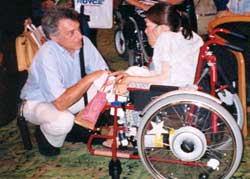 Our readers will be saddened by news of the death of Dr. Tony Oppenheimer, who died of complications of multiple myeloma in November. Many of you knew Dr. Oppenheimer through his extensive email practice on respiratory matters related to neuromuscular disease, begun after he retired in 2000 as Chief of Pulmonary and Critical Care Medicine, Southern California Kaiser Permanente Group. Others experienced Dr. Oppenheimer firsthand as their superb physician at Kaiser, while many of us knew him as a delightfully philosophical and engaging friend, colleague and mentor.
Our readers will be saddened by news of the death of Dr. Tony Oppenheimer, who died of complications of multiple myeloma in November. Many of you knew Dr. Oppenheimer through his extensive email practice on respiratory matters related to neuromuscular disease, begun after he retired in 2000 as Chief of Pulmonary and Critical Care Medicine, Southern California Kaiser Permanente Group. Others experienced Dr. Oppenheimer firsthand as their superb physician at Kaiser, while many of us knew him as a delightfully philosophical and engaging friend, colleague and mentor.
As a member of IVUN’s Medical Advisory Committee, Dr. Oppenheimer provided thoughtful and comprehensive contributions to IVUN publications and careful review of its pulmonary articles. He worked diligently, but gently, to educate ventilator users and their families, to ensure that they became accepted as equal partners in the decision-making process about the use of assisted ventilation.
Dr. Oppenheimer understood the technology and the power of the Internet early on and utilized it to the fullest to educate other health professionals about assisted ventilation. His utmost concern about quality of life issues reflected his belief that users of long-term assisted ventilation at home could live the best possible life.
“Tony epitomized the patient-physician partnership through his work with people who use ventilators longterm in the home care setting. Tony was an ‘R.D.’ or ‘real doctor,’ balancing expert medical care with humor, generosity and compassion. He was also a true advocate for ventilator users,” states Judith R. Fischer, who collaborated with him on several articles for respiratory care journals and for IVUN’s quarterly newsletter, Ventilator-Assisted Living.
Richard Daggett, President of the Polio Survivors Association, Downey, California, whose association enjoyed Dr. Oppenheimer’s talks on post-polio respiratory problems, says, “Polio survivors have lost a good friend. Dr. Oppenheimer provided us with valuable, often life-saving information about pulmonary issues. He was always accessible and generous with his time. He will be missed, both personally and professionally.”
David Ronfeldt agrees. “As Dr. Oppenheimer’s patient since 1979, I found Dr. Oppenheimer (I usually called him ‘Chief’) to be an excellent doctor, skilled at my post-polio respiratory issues, and a fine, sturdy, positive fellow to be around. He was always interested in what else was going on, and always ready with an engaging smile. He listened, he cared, he advised sensibly, he never stopped learning, and at crucial moments he took extra steps that turned out to matter.”
Ismail Tsieprati, who has ALS and has used tracheostomy positive pressure since 1990, and his wife Cheryl remember “Dr. Oppenheimer’s deep love for people and how he took joy and pride in the success and well-being of others. He loved to help others and never stopped giving of himself – the greatest humanitarian we have ever known. He touched our lives profoundly, and we’ll always be grateful for the excellent care, the encouragement, the hope and the support he gave us throughout the years. The world has lost a great man. We have lost a dear friend.”
Professionally, Dr. Oppenheimer was Associate Clinical Professor of Medicine at UCLA’s School of Medicine. He was also a member of the California Thoracic Society, the American Thoracic Society and a fellow of the American College of Physicians and the American College of Chest Physicians.
